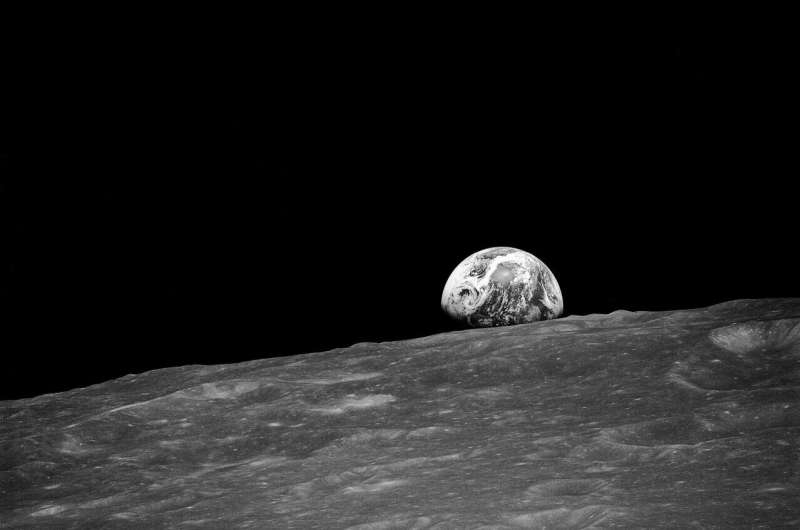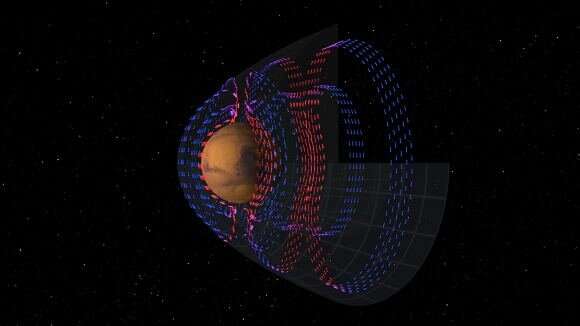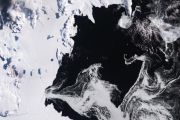
Copernical Team
Beautiful Weekend Views - Sols 3493-3495
 We're heading into a packed weekend, after a successful drive putting us in a great location with some really beautiful views. Everywhere you look in the Navcam mosaic (above) there's something interesting to see!
We're up close to a nifty layered outcrop, which is getting lots of imaging including ChemCam LIBS on targets 'Rukumata' and 'Guarico,' a ChemCam mosaic on 'Kamakusa,' MAHLI dogs
We're heading into a packed weekend, after a successful drive putting us in a great location with some really beautiful views. Everywhere you look in the Navcam mosaic (above) there's something interesting to see!
We're up close to a nifty layered outcrop, which is getting lots of imaging including ChemCam LIBS on targets 'Rukumata' and 'Guarico,' a ChemCam mosaic on 'Kamakusa,' MAHLI dogs Researchers tapped again for NASA moon mission, set to explore mysterious domes

A team of researchers from the University of Central Florida will be exploring an unknown and mysterious region of the moon.
Two UCF planetary scientists, Kerri Donaldson Hanna and Adrienne Dove, have been asked to lead a $35 million mission which would land a spacecraft over the Gruithuisen Domes—an unexplored part of the moon that has left NASA scientists scratching their heads, according to a NASA press release.
The domes, which are found on the western part of the moon, appear to be the result of a rare form of volcanic eruption, according to NASA. What's mysterious about the domes is that such geological structures on Earth require oceans of liquid water and plate tectonics to form. Without such ingredients, NASA scientists are left baffled as to how the structures came to be.
Donaldson Hanna and Dove's work is part of NASA's plan to use more commercial companies to take payloads to the moon through its Commercial Lunar Payload Service program (CLPS), which is headquartered in the Johnson Space Center in Houston. The CLPS program is born from NASA's Artemis lunar exploration plans and efforts to get humans back on the moon.
What is the best radiation shielding for the surface of Mars?

The planet Mars is calling to us. At least, that is the impression one gets when examining all the planned and proposed missions to the red planet in the coming decade. With so many space agencies currently sending missions there to characterize its environment, atmosphere, and geological history, it seems likely that crewed missions are right around the corner. In fact, both NASA and China have made it clear that they intend to send missions to Mars by the early 2030s that will culminate in the creation of surface habitats.
To ensure astronaut health and safety, both in transit and on the surface of Mars, scientists are investigating several means of radiation protection. In a recent study, a team from the Blue Marble Space Institute of Science (BMSIS) studied how various materials could be used to fashion radiation-protective structures. This included materials brought from Earth and those that can be harvested directly from the Martian environment.
Seen from space, the snow-capped Alps are going green
 The famous snow-capped peaks of the Alps are fading fast and being replaced by vegetation cover - a process called "greening" that is expected to accelerate climate change, a study said Thursday.
The research, published in Science, was based on 38 years of satellite imagery across the entirety of the iconic European mountain range.
"We were very surprised, honestly, to find such a huge
The famous snow-capped peaks of the Alps are fading fast and being replaced by vegetation cover - a process called "greening" that is expected to accelerate climate change, a study said Thursday.
The research, published in Science, was based on 38 years of satellite imagery across the entirety of the iconic European mountain range.
"We were very surprised, honestly, to find such a huge Time crystals "impossible" but obey quantum physics
 Scientists have created the first "time-crystal" two-body system in an experiment that seems to bend the laws of physics.
It comes after the same team recently witnessed the first interaction of the new phase of matter.
Time crystals were long believed to be impossible because they are made from atoms in never-ending motion. The discovery, published in Nature Communications, shows th
Scientists have created the first "time-crystal" two-body system in an experiment that seems to bend the laws of physics.
It comes after the same team recently witnessed the first interaction of the new phase of matter.
Time crystals were long believed to be impossible because they are made from atoms in never-ending motion. The discovery, published in Nature Communications, shows th Putting the theory of special relativity into practice, by counting galaxies
 Scientists who study the cosmos have a favorite philosophy known as the "mediocrity principle," which, in essence, suggests that there's really nothing special about Earth, the Sun or the Milky Way galaxy compared to the rest of the universe.
Now, new research from CU Boulder adds yet another piece of evidence to the case for mediocrity: Galaxies are, on average, at rest with respect to th
Scientists who study the cosmos have a favorite philosophy known as the "mediocrity principle," which, in essence, suggests that there's really nothing special about Earth, the Sun or the Milky Way galaxy compared to the rest of the universe.
Now, new research from CU Boulder adds yet another piece of evidence to the case for mediocrity: Galaxies are, on average, at rest with respect to th The Modes of Webb's NIRISS
 The Webb team continues to commission the 17 science instrument modes. This week we asked Nathalie Ouellette of the Universite de Montreal to give more detail about the modes of the Near-Infrared Imager and Slitless Spectrograph (NIRISS), Canada's scientific instrument on Webb.
"NIRISS will be able to capture both images and spectra from different types of celestial objects in near-infrare
The Webb team continues to commission the 17 science instrument modes. This week we asked Nathalie Ouellette of the Universite de Montreal to give more detail about the modes of the Near-Infrared Imager and Slitless Spectrograph (NIRISS), Canada's scientific instrument on Webb.
"NIRISS will be able to capture both images and spectra from different types of celestial objects in near-infrare Another 6 SFL built microsatellites now in orbit
 Six microsatellites developed by Space Flight Laboratory (SFL) were successfully launched by the SpaceX Transporter-5 rideshare mission on May 25. The three GHGSat greenhouse gas monitoring and three HawkEye 360 radio frequency (RF) geolocation microsatellites bring to 36 the total number of SFL-built satellites placed into orbit since 2020.
"SFL congratulates GHGSat and HawkEye 360 for th
Six microsatellites developed by Space Flight Laboratory (SFL) were successfully launched by the SpaceX Transporter-5 rideshare mission on May 25. The three GHGSat greenhouse gas monitoring and three HawkEye 360 radio frequency (RF) geolocation microsatellites bring to 36 the total number of SFL-built satellites placed into orbit since 2020.
"SFL congratulates GHGSat and HawkEye 360 for th Aegis Aerospace and Intuitive Machines team up for lunar science services
 Officials of space and defense technology company Aegis Aerospace Inc. and pioneering space company Intuitive Machines yesterday formally announced they have entered into the first Texas-based business-to-business contract to deliver a commercial science payload to the Moon.
This unique agreement extends Aegis Aerospace's Space Testing as a Service (STaaS) business model from Earth orbit t
Officials of space and defense technology company Aegis Aerospace Inc. and pioneering space company Intuitive Machines yesterday formally announced they have entered into the first Texas-based business-to-business contract to deliver a commercial science payload to the Moon.
This unique agreement extends Aegis Aerospace's Space Testing as a Service (STaaS) business model from Earth orbit t China discloses tasks of Shenzhou-14 crewed space mission
 The upcoming Shenzhou-14 crewed space mission will complete the construction of the Tiangong space station, with a basic three-module structure consisting of the core module Tianhe and the lab modules Wentian and Mengtian, according to the China Manned Space Agency (CMSA) on Saturday.
The mission will build the space station into a national space laboratory, said Lin Xiqiang, deputy direct
The upcoming Shenzhou-14 crewed space mission will complete the construction of the Tiangong space station, with a basic three-module structure consisting of the core module Tianhe and the lab modules Wentian and Mengtian, according to the China Manned Space Agency (CMSA) on Saturday.
The mission will build the space station into a national space laboratory, said Lin Xiqiang, deputy direct 
































